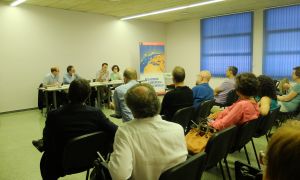This was the great demand of the debate that we celebrated yesterday in Terrassa about the European democratic crisis, in which Lluís Bassets, Pol Morillas, Montserrat Pi and Albert Aixalà accompanied us. The speakers gave their point of view on the problem of legitimacy that the European Union suffers today, as well as the solutions that they propose.
"Can we speak of a true democracy in Catalonia without a true democracy in Europe?", With this open question launched by Aixalà the act began, celebrated in the Vapor Universitari de Terrassa. For Montserrat Pi, it is undeniable that, despite the level of integration achieved, Europe is still in the process of being built today. A process that affects all its layers, and one of them is the legitimacy and democratization of European institutions. Pi recalled that important steps have been taken in this regard - the European citizens 'initiative or the new election system of the president of the European Commission - but she was also skeptical about the real result of these modifications: "The instrument of the citizens' initiative it is positive in the sense that it favors the development of a European political space, but for the time being its impact has been very limited and the Commission has given an ambiguous answer.The Parliament, for its part, has been reinforced, but still not we have seen him playing the leading role in none of the last European crises. " Pi regretted that lately too many decisions are being taken outside the European treaties, seeking the path of intergovernmental agreements without the participation of either the Commission or the Parliament, that the only thing they would demonstrate is the current fracture between the member states of the European Union .
Pol Morillas stressed that the problem is not so much a crisis of democracy in Europe, but of legitimacy. "Something legitimate is what is intelligible by citizens, that is capable of mobilizing and that allows citizen participation." According to Morillas, the problem is that in recent years Europe has decided to sacrifice democracy while protecting economic integration and the nation state, and this has led to confrontation with citizens, whose disinterest has turned into outrage - as has also passed on to local and national scale-. "In this context, the ideas of 'More Europe' and 'Better Europe' have been too short to respond to current problems, because elites and technocrats are the ones who continue to make the decisions". Morillas wanted to mention the well-known and controversial TTIP, arguing that the lack of information is the culprit that the citizen manifests against him without knowing very well what is really at stake.
In reference to the TTIP, Bassets commented that the lack of transparency is inadmissible and that the European Union can come to admit the private arbitration courts, but for him the agreement is indispensable. As for the European democratic crisis, he was more optimistic than Pi and Morillas, wanting to highlight that what has been achieved by Europe to this day is extraordinary, although he admitted that there is a clear lack of energy and will to govern the European Union. "Right now, we are about to carry Schengen because, simply, we do not want to give a European response to the immigration crisis, Europe needs a political gesture and a leap forward, it can not continue taking reactive decisions and small steps".
The intervention of the speakers was followed by a relaxed debate with the approximately 20 attendees. The event was organized in collaboration with the Area of European and International Relations of Terrassa, which plays a very important role in spreading Europeanism in the city. Just now they are about to start the Summer Course on the EU that they have been organizing for 10 years.
In the framework of the debate, it is worth mentioning a recent publication of the Fundació Catalunya Europa, "A president for Europe, the 2014 elections as a response to the European democratic crisis", which analyzes the development of the last European elections and its degree of knowledge among citizens.











